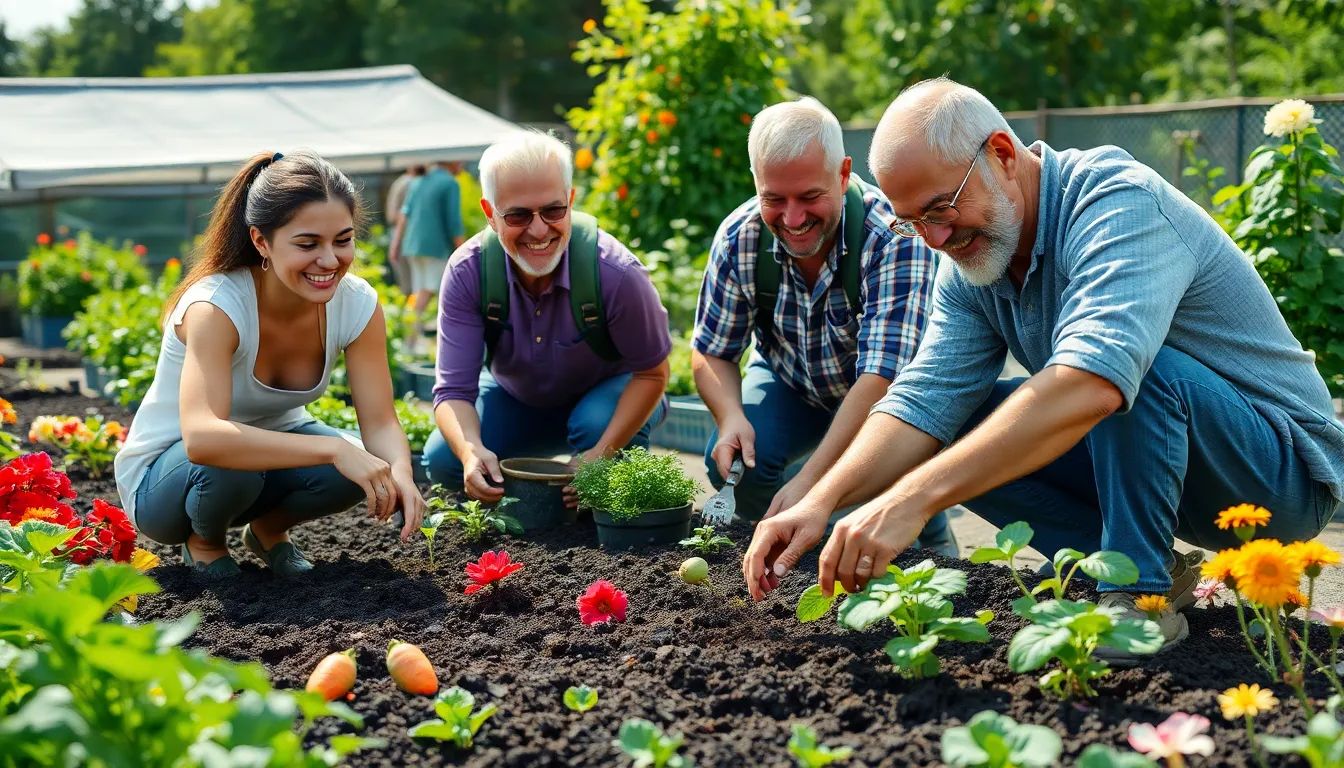In a world where plastic bags are more common than reusable ones, sustainable living might seem like a Herculean task. But fear not! Embracing a greener lifestyle doesn’t require a PhD in environmental science or a complete wardrobe change to hemp clothing. With a sprinkle of creativity and a dash of humor, anyone can transform their daily habits into eco-friendly practices that even Mother Nature would applaud.
Table of Contents
ToggleUnderstanding Sustainable Living Ideas
Sustainable living focuses on reducing one’s environmental footprint through simple, everyday actions. Individuals can start by minimizing single-use plastics, opting for reusable bags and containers instead. Composting food scraps contributes to healthier soil, increasing biodiversity while decreasing landfill waste.
Energy conservation plays a significant role in sustainable living. Using energy-efficient appliances and switching to LED light bulbs can lower electricity bills and reduce carbon emissions. Water-saving devices like low-flow showerheads also contribute to lower water usage without sacrificing comfort.
Growing a home garden encourages self-sufficiency. Homegrown vegetables and herbs not only reduce grocery costs but also ensure access to fresh produce, free of harmful chemicals. Many find joy in cultivating plants, making gardening a rewarding activity that benefits the environment.
Supporting local businesses fosters a strong community foundation. Purchasing from farmers’ markets helps reduce food miles while boosting the local economy. Choices like this promote sustainability and enhance the quality of life in local areas.
Educating others about sustainable practices can multiply positive effects. Sharing knowledge about recycling and zero-waste strategies encourages more people to join the movement towards greener living. Engaging in community clean-up initiatives can also create a tangible impact.
Integrating these sustainable living ideas into daily life proves practical and fulfilling. With small, manageable steps, individuals can significantly contribute to a healthier planet while enjoying the journey of making changes.
Benefits of Sustainable Living

Sustainable living brings various advantages that extend beyond individual lifestyles. Choosing eco-friendly practices helps preserve the planet for future generations.
Environmental Impact
Adopting sustainable living significantly reduces environmental degradation. A decrease in single-use plastics lessens landfill waste, contributing to cleaner oceans and landscapes. Opting for energy-efficient appliances lowers energy consumption, which in turn reduces greenhouse gas emissions. Composting food scraps minimizes waste and enriches soil health, promoting biodiversity. Growing home gardens not only provides fresh produce but also decreases dependence on industrial farming, which often relies on harmful practices. Supporting local businesses cuts food miles, further lowering carbon footprints. Each small, intentional choice creates a ripple effect that enhances environmental health.
Health Benefits
Sustainable living positively influences personal well-being. Fresh, homegrown fruits and vegetables offer better nutrition compared to processed foods. Reducing plastic use decreases exposure to harmful chemicals found in many plastic products. Engaging in activities such as gardening and community clean-ups promotes physical fitness and mental wellness. Additionally, enhanced air quality, resulting from reduced pollution, benefits respiratory health. Connecting with local farmers fosters community relationships, leading to an improved sense of belonging. Overall, embracing sustainable practices enriches health while connecting individuals to the environment.
Practical Sustainable Living Ideas
Sustainable living encompasses several practical strategies that anyone can adopt. Each idea contributes to a healthier environment while enhancing one’s quality of life.
Home and Energy Efficiency
Energy-efficient appliances significantly lower utility bills. Lighting choices should focus on LEDs, which consume less energy and last longer. Sealing drafts through windows and doors improves heating and cooling efficiency. Smart thermostats allow precise control, reducing energy waste. Regular maintenance of heating and cooling systems ensures they operate optimally. Utilizing natural light during the day can minimize reliance on artificial lighting. Additionally, incorporating insulation enhances comfort and energy savings throughout the year.
Eco-Friendly Transportation Options
Walking and biking offer excellent alternatives for short trips. Public transportation, such as buses and trains, reduces individual carbon footprints. Carpooling not only saves money but also decreases the number of vehicles on the road. Choosing electric or hybrid vehicles further minimizes greenhouse gas emissions. Ridesharing apps provide convenient options while supporting eco-friendly infrastructure. Combining errands into one trip can cut down on unnecessary driving. Encouraging businesses to support remote work options helps reduce overall commuting.
Sustainable Food Choices
Sustainable food choices play a crucial role in supporting environmentally friendly living. By focusing on organic and local produce, individuals contribute to a healthier planet.
Organic and Local Produce
Choosing organic and local produce promotes sustainable agriculture. Organic farming reduces chemical use, protecting soil health and biodiversity. Local produce minimizes transportation emissions, enhancing freshness and flavor. Farmers’ markets provide a great venue for sourcing seasonal fruits, vegetables, and grains. This approach fosters community connections while supporting the local economy. Choosing organic options often means reduced pesticide exposure, which benefits both personal health and the environment.
Reducing Food Waste
Reducing food waste is vital in creating sustainable food systems. Every person can start by planning meals to utilize ingredients fully, preventing excess purchases. Composting food scraps returns nutrients to the soil, closing the loop in food production. Leftovers can be creatively repurposed into new dishes, decreasing waste significantly. Additionally, choosing to buy “imperfect” fruits and vegetables encourages acceptance of less-than-perfect produce. With mindfulness, individuals can cultivate habits that significantly lessen their environmental impact while promoting resource efficiency.
Community and Lifestyle Practices
Sustainable living extends beyond personal habits. It also encompasses community involvement and lifestyle choices that promote eco-friendliness.
Sustainable Clothing
Sustainable clothing focuses on materials and production methods that minimize environmental impact. Ethically sourced fabrics, such as organic cotton and hemp, greatly reduce chemical use, thus benefiting soil health. Buying second-hand items and participating in clothing swaps helps divert textiles from landfills while promoting a circular economy. Supporting brands that prioritize fair labor practices encourages responsible consumerism. In addition, choosing high-quality garments designed to last reduces the frequency of replacements, reinforcing sustainable habits in wardrobes.
Community Involvement
Community involvement amplifies the effects of sustainable practices. Engaging in local clean-up events fosters environmental stewardship while building neighborhood connections. Participating in community gardens encourages sharing resources, fresh produce, and gardening knowledge. Local workshops on topics like composting, recycling, and sustainable practices raise awareness and educate others. Supporting initiatives that promote renewable energy and local conservation efforts creates a collaborative spirit. When individuals come together for a common purpose, they enhance collective impact and inspire others to join the movement.
Embracing sustainable living isn’t just about making big changes; it’s about small, consistent actions that add up. By incorporating eco-friendly practices into daily routines, individuals can significantly reduce their environmental impact while enhancing their quality of life.
From choosing reusable bags to supporting local farmers, every effort counts. Engaging with the community and educating others amplifies these benefits, creating a ripple effect of positive change.
Ultimately, sustainable living fosters a healthier planet and promotes personal well-being, proving that a greener lifestyle is not only achievable but also rewarding.



